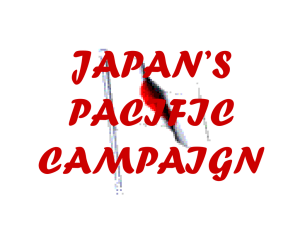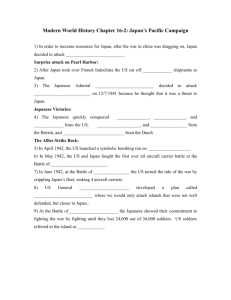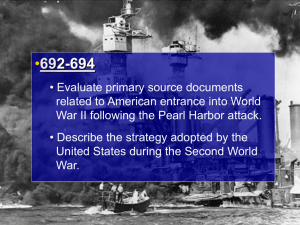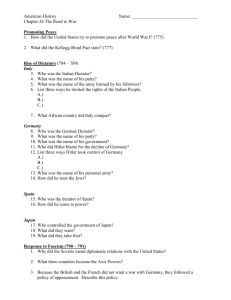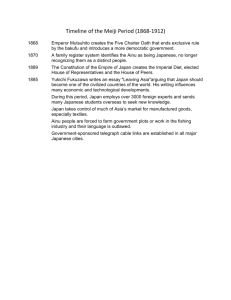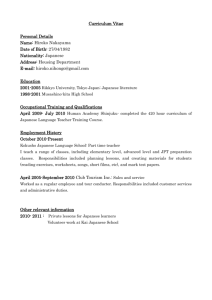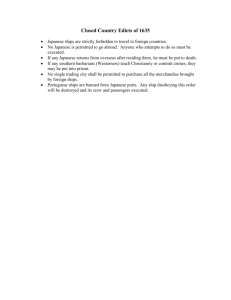World War II: Allied Powers vs. Axis Powers
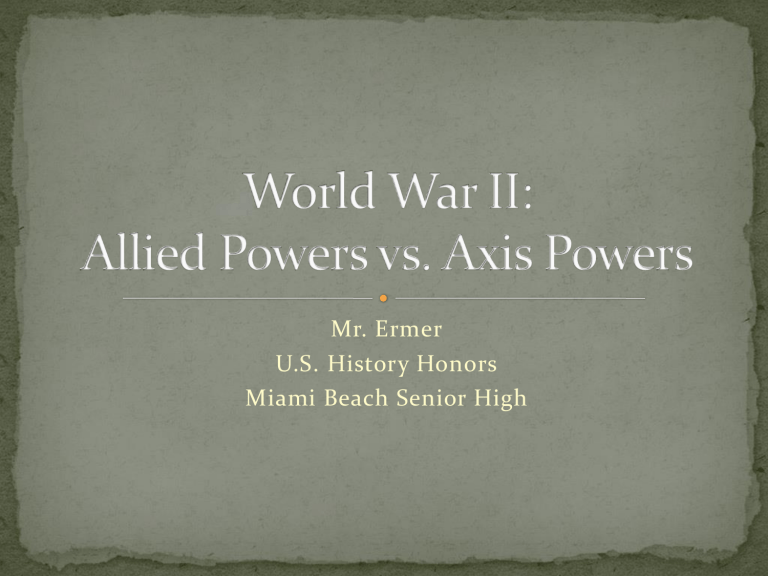
Mr. Ermer
U.S. History Honors
Miami Beach Senior High
Admiral Chester Nimitz, Commander of U.S. Pacific Fleet
Plans to use surviving aircraft carriers against Japan
Cannot mobilize fast enough to stop Japan from taking S.E. Asia
Japan attacks U.S. bases in Philippines, land troops later
Gen. Douglas MacArthur’s troops hid in Bataan for 3 mos.
Gen. MacArthur evacuated to Australia
McArthur’s troops captured by Japanese, marched 65 miles
Philippines falls to Japan
Doolittle Raid
To raise morale, FDR orders bombing of Tokyo
April: 16 B-25s bomb Tokyo, land in China
Japan changes course
Japan no longer worried about cutting off supply lines
New plan is to lure U.S. fleet into battle by attacking Midway
Japanese plan to cut U.S. supply lines to Australia by attacking
New Guinea, but U.S. broke the secret code, Battle of Coral Sea
Aircraft Carriers Lexington & Yorktown attack Japanese fleet
Carriers eventually sunk, but Japanese stopped
Navajo “code talkers” used by U.S. Marine Corp
Japanese could not “crack” the Navajo code, orders stayed secret and were quickly transmitted
U.S. Code Breakers learn about attack on Midway
Japanese carriers sail into an ambush
1 st wave of Japanese planes shot down by Americans
Four Japanese carriers sunk by American bombers
Battle of Midway was a turning point in the war
362 dead Americans, 3,057 dead Japanese
Two part plan to defeat the Japanese:
Admiral Nimitz’s Navy island hopping closer to Japan
Gen. McArthur to lead army to recapture Philippines
Amphtracs used to land Marines on coral atolls
1943-45: Marines take islands 1 by 1, move closer to Japan
B-29 “Superfortress” bomber, fly farther than other planes
MacArthur’s troops begin drive at Guadalcanal
Catch up to Navy and take New Guinea
Next stop: Philippines (land on 10/20/1944)
Japanese launch surprise attack, use kamikaze pilots
Early Japanese retreat saves U.S. at Battle of Leyte Gulf
Battle for control of the Philippines lasts until end of war
FDR wants badly to invade Europe, his advisors and
British PM Winston Churchill advise against
Want to invade Africa for two reasons:
Taking control of Africa would not be as difficult
The Army could get practice without needing too many troops
After early losses, Gen. Eisenhower replaces leaders
Gen. George Patton assigned to Africa
Convoy system, radar, sonar help Allies control Atlantic
With W. Europe under Nazi control, Hitler pushes east to destroy the Soviet economy—Stalingrad is main target
Battle lasts from September 1942-February 1943
Nazis not prepared for Russian winter
Heavy Nazi losses
Battle of Stalingrad
US, UK, USSR form Grand Alliance, stress military operations, not political differences
Agree to fight until all Axis Powers surrender
1942: War turns against Germany, Japan
Nov ’42: Allies invade N. Africa, defeat Germans May ’43
Feb ’43: German Sixth Army surrenders at Stalingrad
June ’42: USA sinks 4 Japanese carriers at Midway
Gen MacArthur begins offensive in Philippines
Combined Army, Marine and Navy “island hopping”
May 1943: Axis Tunisia surrenders
Casablanca Conference: FDR and Churchill agree to destroy
German economic & military potential
Weaken German morale
First, attack Italy “the soft underbelly” of the Axis Powers
September 1943: Allies invade Italian island of Sicily
American & British bombing of Germany picks up
Did not weaken German economy or morale, but created gas shortage, interrupted railroads, wrecked airplane factories—
Allies now controlled the air
Allies invade Italy, move north quickly, Mussolini arrested by
King Victor Emmanuel III—Germans return him to power
Allies land at Anzio, behind Nazi lines at Cassino, fighting lasts for three months—Allies take Rome in May 1944
